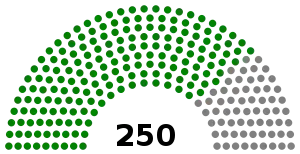2016 Syrian parliamentary election
Parliamentary elections were held in Syria to elect the People's Council on 13 April 2016. Syria's parliamentary elections occur every four years, with the last in 2012, while presidential elections are done every seven years, with the last in 2014. The current parliamentary term ends in 2020, which is consequently the planned date for the next parliamentary election.
| ||||||||||||||||||||||
All 250 seats to the Parliament of Syria 126 seats are needed for a majority | ||||||||||||||||||||||
|---|---|---|---|---|---|---|---|---|---|---|---|---|---|---|---|---|---|---|---|---|---|---|
| ||||||||||||||||||||||
| ||||||||||||||||||||||

Background
Amidst nearly five years of civil war and ensuing negotiations for a ceasefire, following the Russian military intervention in the Syrian Civil War and Syrian Arab Army gains, President Bashar al-Assad called the election.
At the time of the election, Idlib Governorate was almost entirely outside government control, as it was controlled by rebels. Raqqa Governorate and Deir ez-Zor Governorate were mostly occupied by ISIL. As such, elections did not take place in these provinces. Parts of Aleppo, Homs, and Daraa governorates were also held by anti-government forces at the time of the election. Rojava had also been semi-autonomous since the civil war began.
Electoral system
All 250 members of the People's Council were elected from 15 multi-member constituencies[1] in general tickets.
| Constituency | Seats | Population (est. 2011)[2][3] |
|---|---|---|
| Damascus Governorate | 29 | 1,754,000 |
| Rif Dimashq Governorate | 19 | 2,836,000 |
| Aleppo (city) | 20 | 2,132,100 |
| Aleppo Governorate | 32 | 2,735,900 |
| Homs Governorate | 23 | 1,803,000 |
| Hama Governorate | 22 | 1,628,000 |
| Latakia Governorate | 17 | 1,008,000 |
| Idlib Governorate | 18 | 1,501,000 |
| Tartus Governorate | 13 | 797,000 |
| Raqqa Governorate | 8 | 944,000 |
| Deir ez-Zor Governorate | 14 | 1,239,000 |
| Al-Hasakah Governorate | 14 | 1,512,000 |
| Daraa Governorate | 10 | 1,027,000 |
| As-Suwayda Governorate | 6 | 370,000 |
| Quneitra Governorate | 5 | 90,000 |
| Total | 250 | 21,377,000 |
Results
The Ba'ath Party-led National Progressive Front won 200 of the 250 seats, while the opposition inside and outside the country boycotted the elections; voter turnout was 57.56%. Two Armenians were elected to the People's Council.[4]
Summary of the 13 April 2016 People's Council of Syria election results
| Parties | Votes | % | Seats | Seats inside |
|---|---|---|---|---|
| National Progressive Front (al-jabha al-waTaniyyah at-taqaddumiyyah) | 200 | |||
|
172 | |||
|
7 | |||
|
2 | |||
|
3 | |||
|
1 | |||
|
1 | |||
|
2 | |||
|
12 | |||
| Independents not aligned with National Progressive Front | 50 | |||
| Total | 250 | |||
| Source: IPU | ||||
Reactions
 Germany - Martin Schaefer, spokesman for the Foreign Ministry has announced that Germany would not accept the results of the election. He stated that "holding free and fair elections is simply impossible in the current situation, with all the refugees, in a full civil war situation."[5]
Germany - Martin Schaefer, spokesman for the Foreign Ministry has announced that Germany would not accept the results of the election. He stated that "holding free and fair elections is simply impossible in the current situation, with all the refugees, in a full civil war situation."[5] United States - John Kirby, spokesman for the United States Department of State has announced that the United States believes the elections to not be credible, fair or free. He cited the departure of many citizens as a result of the Syrian Civil War.[6]
United States - John Kirby, spokesman for the United States Department of State has announced that the United States believes the elections to not be credible, fair or free. He cited the departure of many citizens as a result of the Syrian Civil War.[6]
References
- President Assad calls for parliamentary elections next April AMN, 22 February 2016
- "Population estimates on 31 December 2011" (in Arabic). Central Bureau of Statistics. Archived from the original on 3 March 2016. Retrieved 23 February 2016.
- "2004 census data" (in Arabic). Central Bureau of Statistics. Archived from the original on 4 March 2016. Retrieved 23 February 2016.
- Hairenik. "Two Armenians Elected to Syria's Parliament". Armenian Weekly.
- "The Latest: Syrian opposition in Geneva lashes out at Assad". The Chronicle Herald.
- "Archived copy". Archived from the original on 25 April 2016. Retrieved 19 April 2016.CS1 maint: archived copy as title (link)
